| Official Name: | Plurinational State of Bolivia |
| Official Language: | Spanish |
| Area: | 1,098,581 km2 (424, 164 sq mi) |
| Population: | 11,430,000 |
| Time Zone: | UTC−4 |
| Capital City: | Sucre |
| Elevation (La Paz): | 3,640 m (11,942 ft) |
| Currency: | Boliviano (BOB) |
| Main Cities: | Santa Cruz, El Alto, La Paz, Sucre |
| Main Port: | Port of Aguirre |
| Required visa for entry: | Nationals from the UK and EU countries DO NOT require visas. Click here for more information concerning visa requirements. |
| Required vaccination for entry: | None. |
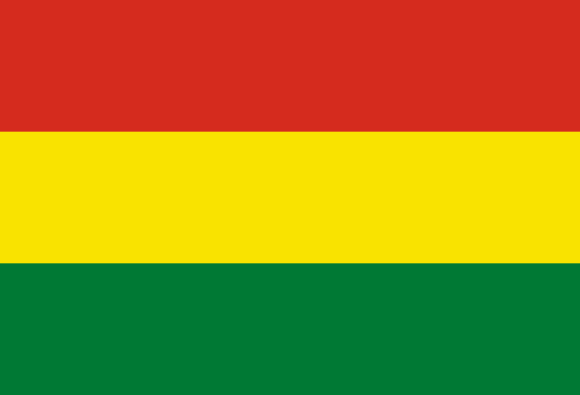
Main Risks:
Theft, robbery, kidnapping, extortion, rape, drug and human trafficking, fraud, vehicle assault.
Executive Summary
Bolivia features intermediate risks chiefly associated with the possibility of suffering armed and unarmed robbery at the hands of common criminals. Security risks increase if itineraries involve road travel through the countryside areas. In case of high-profile travel, we recommend hiring secure transportation and protection services, especially if the itinerary requires travel to rural areas via land routes.

General Risk Level: MEDIUM.
Although the risk level nationwide generally stays medium, the security situation can change significantly in remote areas and impoverished neighborhoods. As a precaution, for itineraries outside the larger cities, it is best to review security measures under the supervision of reputable security professionals.
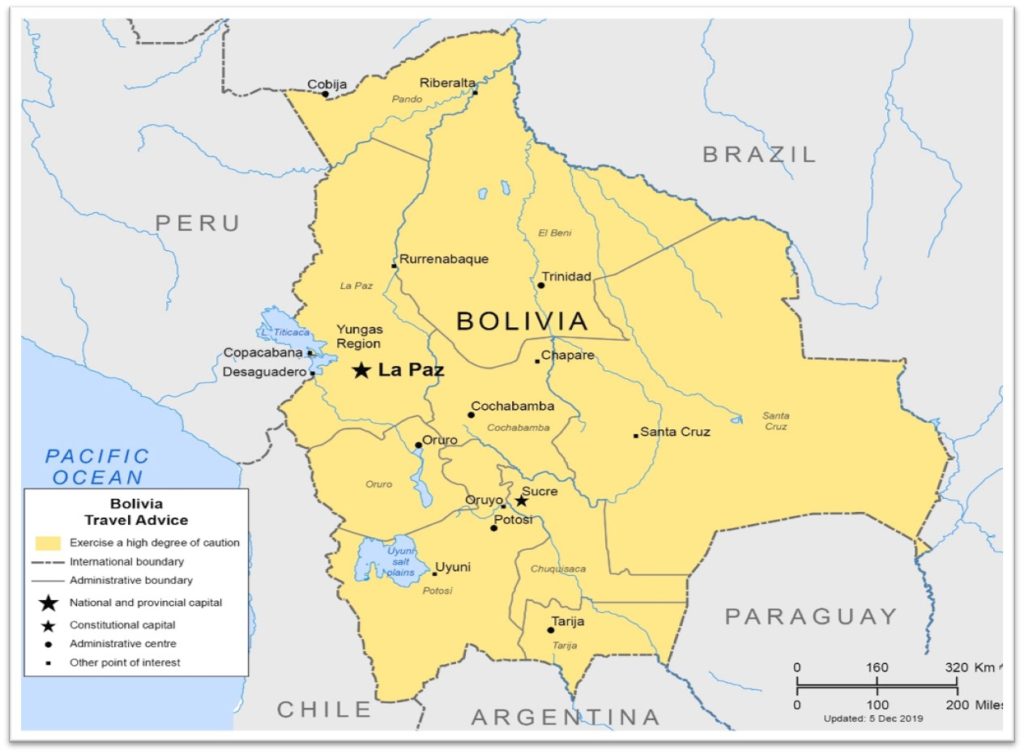
Crime and Security
Similar to what transpires in other Latin American countries, low and medium-level crime represents the main threat to travelers visiting Bolivia. The risk of suffering robbery is higher in the largest urban areas, mainly in La Paz and El Alto. Some criminals resort to operating either registered of fake taxis, taking advantage of their victim’s carelessness to transport them to remote areas beyond police control, and assault them. Foreigners and locals alike are liable to be targeted. That said, foreigners may be specifically targeted due to perceptions of wealth. For this reason, avoid non-essential travel to relatively impoverished urban areas and sites not commonly frequented by foreigners, including El Alto.
Following the resignation of former President Evo Morales in November 2019, there is political risk in the country, chiefly associated with the legitimacy of the incumbent government. This scenario could potentially bring about unrest and episodes of vandalism, further leading to clashes between security forces and activists. For this reason, travelers should monitor the political situation before traveling. In any case, as a precaution, avoid the vicinity of any demonstration.
Please note that credit and debit cards are not usually accepted outside hotels, businesses, and large shops. This is especially the case in El Alto and La Paz. Casual transactions are generally carried informally in cash. For this reason, it is best to sell USD or Euros for BOB at reputable exchange houses. As a rule of thumb, in Bolivia we do not advise using cards due to the risk of identity theft and fraud.
Security in La Paz and El Alto
La Paz and El Alto feature irregular streets unevenly distributed over hills and heights. The combined extent of the urban area and its adverse topography make it easy for foreigners to get lost or suffer from altitude sickness. Moreover, most neighborhoods, especially in El Alto, are relatively impoverished. Foreigners can be targeted by criminals due to perceptions of affluence. It is thus necessary to stay alert at all times and exercise caution while traveling through the cities. If possible, avoid non-essential travel to El Alto for purposes other than reaching or departing the International Airport (LPB). In La Paz, the areas recommended for lodging, travel, and conducting business and transactions are limited to the city center, especially Tembladerani, Sopocachi, and San Jorge. The latter serves as La Paz’s financial district and houses foreign embassies. It is thus considered one of the safest and most convenient areas to stay. The trip from San Jorge and the airport should take between 45 and 60 minutes depending on traffic.
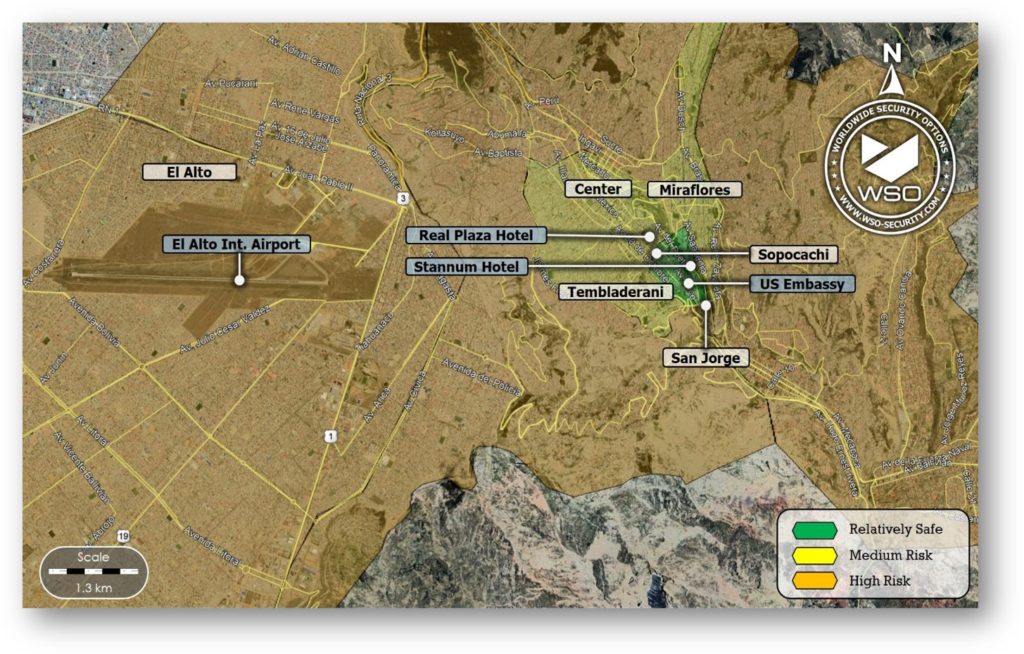
Security in Santa Cruz de la Sierra
Santa Cruz is considered the most important business center in Bolivia, being also one of the fastest-growing. The city has one of the best hotel infrastructure in the country, and, unlike La Paz, travelers should find it relatively easy to travel through the city. That said, crime remains a threat to foreigners. Travelers should avoid venturing into peripheral areas in eastern parts of the city, especially beyond the Cuarto Anillo (“Forth Ring”) Avenue. Moreover, please be advised that the Mutualista Market area and the city center, especially surrounding Plaza 24 de Septiembre (Square) are considered highly dangerous in terms of pickpocketing activity. The best area for staying and conducting business is Equipetrol, which features office towers and prominent residential buildings.
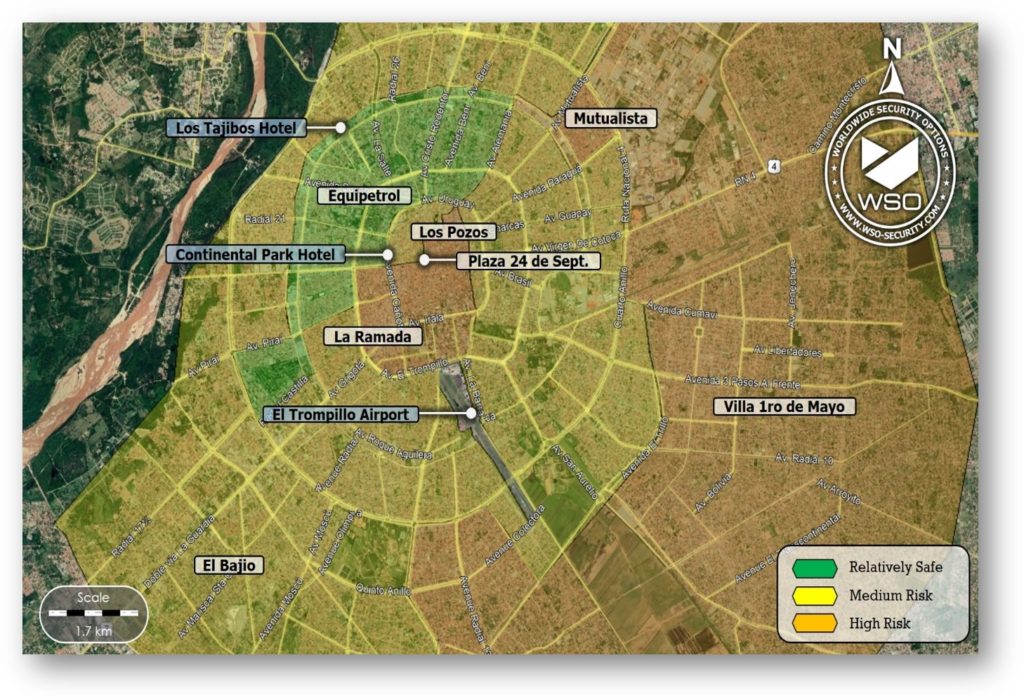
Two airports are serving the city. El Trompillo (SRZ) is relatively close to the city center and serves domestic routes. Travel between Equipetrol and the airport should take between 15 and 20 minutes depending on traffic. In turn, the Viru Viru International Airport (VVI) is Bolivia’s largest, serving international and domestic routes alike. The airport is located north of the city, approximately 30 minutes away from Equipetrol.
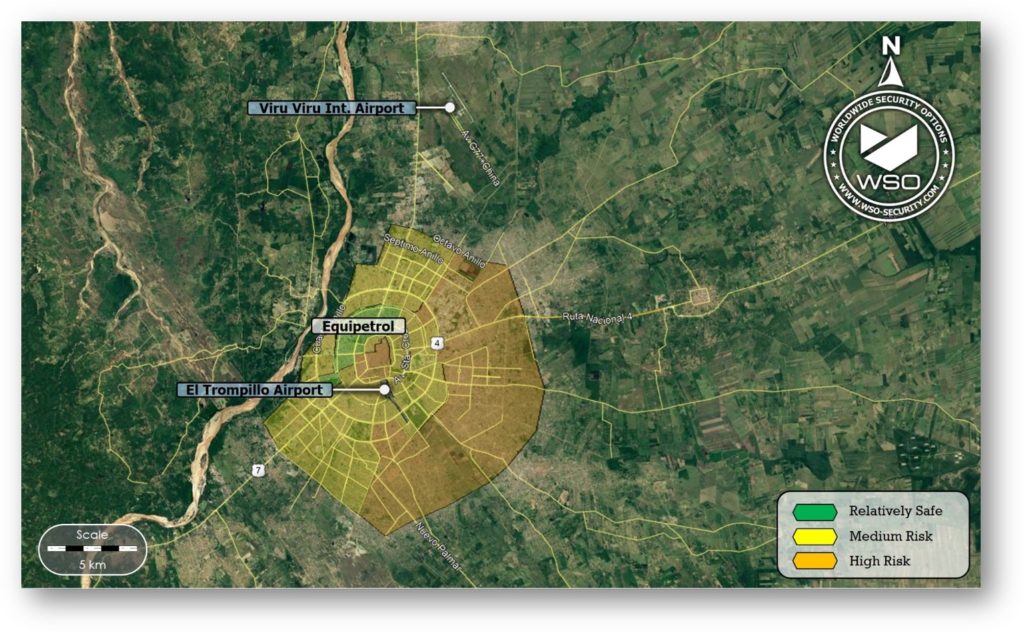
Transportation
For security reasons, we do not recommend using public transportation services in Bolivia. We advise hiring reputable private transportation services in advance. In the event of high-profile visits, it is best to procure private protection services as well. Taxis vetted by the main hotels may also be used, preferably booked in advance. For security reasons, avoid stoping regular taxis on the streets. Also note that some taxi drivers might try to take advantage of foreigners by taking longer routes to inflate the fare, especially in La Paz.
The best option for intercity travel is to take commercial flights. Due to Bolivia’s adverse topography, some routes present heightened risks, especially if travel takes place during the dark hours, under conditions of poor visibility or heavy rains. This also applies for the Yungas Road, popularly visited by mounting bike enthusiasts. The route is famous for being highly dangerous and potentially deadly.
Furthermore, some highways are exposed to landslides or feature narrow lanes. For this reason, if the itinerary requires travel through the remote or sparsely populated areas, make sure to plan the route in advance under the supervision of local security professionals. Educated assessments should enable the security contractor to determine the safest route and avoid unilluminated or otherwise dangerous paths.
Health and Sanitary Conditions
While no proof of vaccination is required for entry into the country, it is recommended to have the following vaccines before traveling: yellow fever, tetanus, hepatitis A and B, and typhoid. It is also necessary to wear protection against bugs and avoid leaving body areas uncovered to mitigate the risk of suffering insect and mosquito-borne diseases such as Dengue, Chagas, and the Zika virus. These precautions must be followed while entering remote and jungle areas. The quality of tap water in cities is deemed acceptable. However, if in doubt, especially while staying in remote areas, resort to sealed bottled water.
It is not advised to travel without international health insurance covering emergency medical evacuation to the country of origin.
Take essential health precautions to mitigate the risk of contracting diseases or viruses. Carry masks in crowded places such as airports and maintain rules of social distance and avoid contact with surfaces of common use in public places. Always carry hand sanitizer.
Tactical Recommendations
Exercise vigilance and situational awareness throughout the trip to Bolivia, especially in urban areas vulnerable to low and medium-level criminal activity. Avoid travel to high-risk areas. If possible, avoid non-essential travel to the inner parts of El Alto.
We recommend hiring private transportation services for business and high-profile trips, especially if travel through the countryside is required. Avoid public transportation.
Avoid carrying large sums of cash or valuables during the trip. We advise against wearing or carrying items in public that may give the impression of economic affluence and which could attract unwanted attention from criminals.
Avoid traveling through the country in sport or luxurious cars which could attract unwanted attention from criminals and corrupt police officers.
Do not resist armed robbery attempts. We recommend to always carry a few 100 BOB bills for duress cases, specifically to appease criminals looking for easy money.
For security reasons avoid travel during night hours, even in the larger cities.
We recommend lodging in reputable establishments and hotels with private security. In La Paz, it is best to stay in San Jorge and the city center. In Santa Cruz de la Sierra the best option is Equipetrol.
If private transportation services are unavailable, resort to reputable radio taxi companies, provided they are recommended by the best hotels. Stay alert at all times while traveling by taxi to prevent the driver from taking unnecessary detours or from inflating the fare.
If travel by route through the countryside is required, avoid all detours, especially while traveling through sparsely populated zones or areas featuring adverse topography. If possible, plan routes and stopovers ahead with the support of a local security contractor.
Avoid the vicinity of every kind of political demonstration or rally in urban areas. Peaceful demonstrations are liable to be infiltrated by violent elements. As a precaution, consider monitoring the political situation in Bolivia before travel takes place.
Take all necessary precautions to mitigate the risk posed by insect and mosquito-borne diseases.
Emergency Contacts
Police: 110
Ambulance: 118
Fire: 119
WSO Global Command Center: +1 956 467 4858 / gcc@wso-security.com
Security advice and assistance over WhatsApp: +593 99 461 1128 / +521 81 1511 3166







